BLAST OF SILENCE (1961) Directed by Allen Baron
7 years ago
Film Reviews and other movie happenings
 -Suppose you were the last man on Earth.
-Suppose you were the last man on Earth. Fyodor Dostoevsky is, possibly, the greatest novelist of all-time. Of course, is contemporary and compatriot, Leo Tolstoy, would give him a good run for his money. And, The Brother's Karamazov, is probably his greatest novel, though The Idiot, Crime and Punishment and The Possessed (oft-called Devils) are also great in their own right. The fact, however, is that there hasn't been a Russian-language adaptation made of the novel, that is readily available here in the United States.
Fyodor Dostoevsky is, possibly, the greatest novelist of all-time. Of course, is contemporary and compatriot, Leo Tolstoy, would give him a good run for his money. And, The Brother's Karamazov, is probably his greatest novel, though The Idiot, Crime and Punishment and The Possessed (oft-called Devils) are also great in their own right. The fact, however, is that there hasn't been a Russian-language adaptation made of the novel, that is readily available here in the United States.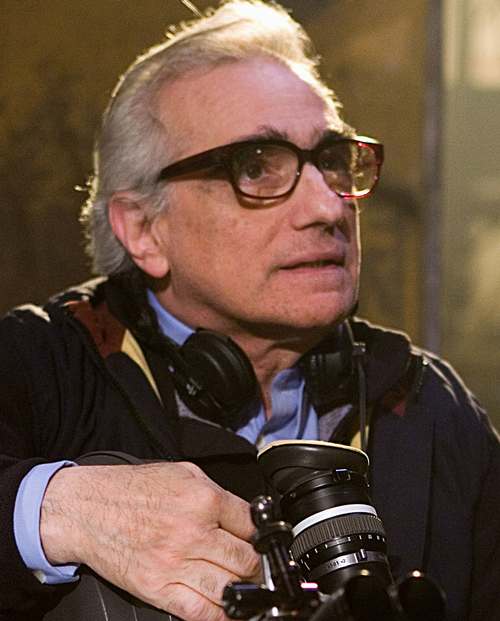 Moving your stuff from one computer to another is always a daunting task; however, when you move things from a PC to a Mac things become increasingly difficult...especially when external hard-drives are involved. A couple of summers ago I went out and got myself a nice Terabyte hard-drive to put all of my movies on. For the record that was painstaking enough. However, when I switched computers files and folders were lost along the way, and at some point I deleted my entire Martin Scorsese catalogue.
Moving your stuff from one computer to another is always a daunting task; however, when you move things from a PC to a Mac things become increasingly difficult...especially when external hard-drives are involved. A couple of summers ago I went out and got myself a nice Terabyte hard-drive to put all of my movies on. For the record that was painstaking enough. However, when I switched computers files and folders were lost along the way, and at some point I deleted my entire Martin Scorsese catalogue. Casablanca (1942) Michael Curtiz - Let the record show that choosing a "number one" film for the 1940s was the hardest of the decades yet because there were two films that easily could have been chosen. But, when all was said and done, how could I go against Humphrey and Ingrid? Is there really any doubt that this film about two war-torn lovers who meet in Paris and meet again in Casablanca is the most romantic film ever. At least the most romantic ever made about World War II. The film was adapted from a little-known stage play and was originally supposed to be another cheaply made mass produced picture by Warner Bros. Studio and star future president Ronald Reagan. As luck would have it, however, Bogart ended up taking the lead role in the film sharing the headline with Swedish beauty, Ingrid Bergman. The film would go on to win three Academy Awards for Best Picture, Director and Screenplay, and in 2006 the Writers Guild of America named it the greatest screenplay ever written, and the American Film Institute has it currently ranked as the 3rd greatest American film ever made. I have my doubts its because the scenario is truly relatable for a large majority of people, but I also have my suspicions that most people have experienced love-lost or had a "We'll always have Paris"-type moment in their personal story. Humphrey Bogart and Ingrid Bergman would both star in several of the pictures to be listed below, but in 1942, they captured the hearts of thousands when they starred together for the only time in both of their outstanding careers.
Casablanca (1942) Michael Curtiz - Let the record show that choosing a "number one" film for the 1940s was the hardest of the decades yet because there were two films that easily could have been chosen. But, when all was said and done, how could I go against Humphrey and Ingrid? Is there really any doubt that this film about two war-torn lovers who meet in Paris and meet again in Casablanca is the most romantic film ever. At least the most romantic ever made about World War II. The film was adapted from a little-known stage play and was originally supposed to be another cheaply made mass produced picture by Warner Bros. Studio and star future president Ronald Reagan. As luck would have it, however, Bogart ended up taking the lead role in the film sharing the headline with Swedish beauty, Ingrid Bergman. The film would go on to win three Academy Awards for Best Picture, Director and Screenplay, and in 2006 the Writers Guild of America named it the greatest screenplay ever written, and the American Film Institute has it currently ranked as the 3rd greatest American film ever made. I have my doubts its because the scenario is truly relatable for a large majority of people, but I also have my suspicions that most people have experienced love-lost or had a "We'll always have Paris"-type moment in their personal story. Humphrey Bogart and Ingrid Bergman would both star in several of the pictures to be listed below, but in 1942, they captured the hearts of thousands when they starred together for the only time in both of their outstanding careers. Rear Window (1954) Alfred Hitchcock - Jimmy Stewart may be the most lovable leading man in the history of Hollywood. Alfred Hitchcock may be the greatest suspense director in the history of cinema. The two teamed up several times and made several great films. But 1954's Rear Window is the mother of them all. The film takes place, almost exclusively, in one room and from one vantage point. This can be maddening, and I have a nagging suspicion that that is the point. Why should we as the audience get any better view than the leading man? After all, it is his story, and it is his camera lens that we're seeing the picture through. Hitchcock once said that it is the director's job to "play the audience like a piano," and there is not a better example of his doing so than in Rear Window. Many say that Vertigo is the master's opus and some may add Psycho, It seems to me, however, that this gem is his most overlooked, with the possible exception of one a little further down the list.
Rear Window (1954) Alfred Hitchcock - Jimmy Stewart may be the most lovable leading man in the history of Hollywood. Alfred Hitchcock may be the greatest suspense director in the history of cinema. The two teamed up several times and made several great films. But 1954's Rear Window is the mother of them all. The film takes place, almost exclusively, in one room and from one vantage point. This can be maddening, and I have a nagging suspicion that that is the point. Why should we as the audience get any better view than the leading man? After all, it is his story, and it is his camera lens that we're seeing the picture through. Hitchcock once said that it is the director's job to "play the audience like a piano," and there is not a better example of his doing so than in Rear Window. Many say that Vertigo is the master's opus and some may add Psycho, It seems to me, however, that this gem is his most overlooked, with the possible exception of one a little further down the list.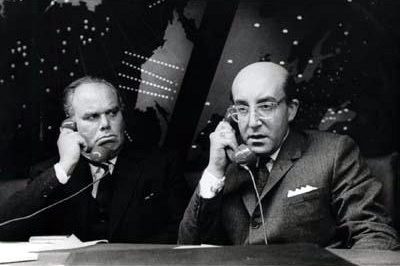 Dr. Strangelove, or: How I Learned to Stop Worrying and Love the Bomb (1964) Stanley Kubrick - Let it be known that Stanley Kubrick is one of the greatest filmmakers ever. Period. Even those who do not enjoy his pictures can recognize the skill and care of the craft. Kubrick was nothing if he weren't a technical master. That said, this is his masterpiece. Dr. Strangelove, is quite possibly the funniest film ever made. If it is not, I'd be hard pressed to think of any better. But This film is more than hysterical, it is also incredibly smart and nearly perfectly crafted. The film is a satire of the Nuclear threat that was on constant red alert in the United States and in the Soviet Union. At the center of this "hot line suspense comedy" is a triad of performances by the vastly under appreciated, Peter Sellers. His portrayal of the US President was so funny and irreverent that the film was due to come out in November 1963, but after the assassination of John F. Kennedy, Kubrick decided that it wouldn't be appropriate for release and personally held it back until February 1964. Which is the kind of man and filmmaker Kubrick was, as we was quoted as saying, "One man writes a novel. One man composes a symphony. It is necessary for one man to make a film."
Dr. Strangelove, or: How I Learned to Stop Worrying and Love the Bomb (1964) Stanley Kubrick - Let it be known that Stanley Kubrick is one of the greatest filmmakers ever. Period. Even those who do not enjoy his pictures can recognize the skill and care of the craft. Kubrick was nothing if he weren't a technical master. That said, this is his masterpiece. Dr. Strangelove, is quite possibly the funniest film ever made. If it is not, I'd be hard pressed to think of any better. But This film is more than hysterical, it is also incredibly smart and nearly perfectly crafted. The film is a satire of the Nuclear threat that was on constant red alert in the United States and in the Soviet Union. At the center of this "hot line suspense comedy" is a triad of performances by the vastly under appreciated, Peter Sellers. His portrayal of the US President was so funny and irreverent that the film was due to come out in November 1963, but after the assassination of John F. Kennedy, Kubrick decided that it wouldn't be appropriate for release and personally held it back until February 1964. Which is the kind of man and filmmaker Kubrick was, as we was quoted as saying, "One man writes a novel. One man composes a symphony. It is necessary for one man to make a film." The Godfather pts I & II (1972/1974) Francis Ford Coppola - This may seem like, and may be a cop out. But I don't care. The fact of the matter is that these two films are one story, follow one arc, are perfect and belong to the greatest decade in the history of cinema, and as it is the greatest decade in the history of cinema it deserves to have double the pictures (totaling nearly 6 1/2 hours) than the other decades have had. As I have already stated, these two films are completely perfect. There is little that I can say that can add to the endless literature on these two pictures, the arc of a man's life from young idealist that wants nothing to do with the "family business" to running it. Al Pacino delivers two of the great performances of his career, if not of all time as Michael Corleone and Marlon Brando and Robert de Niro both give knock out performances as Michael's father, Vito 'Don' Corleone. The constant tragedy that envelopes this family are incredible, the way that they're able to wade through it and get passed it...or become it. However, despite both of these films being as great as they are, there is one scene that goes beyond the point of perfection at the end of the first film wherein Coppola shows the baptism of a child and the end of a bloody gang war, and the juxtaposition of the scene may be the greatest scene I have ever seen on celluloid.
The Godfather pts I & II (1972/1974) Francis Ford Coppola - This may seem like, and may be a cop out. But I don't care. The fact of the matter is that these two films are one story, follow one arc, are perfect and belong to the greatest decade in the history of cinema, and as it is the greatest decade in the history of cinema it deserves to have double the pictures (totaling nearly 6 1/2 hours) than the other decades have had. As I have already stated, these two films are completely perfect. There is little that I can say that can add to the endless literature on these two pictures, the arc of a man's life from young idealist that wants nothing to do with the "family business" to running it. Al Pacino delivers two of the great performances of his career, if not of all time as Michael Corleone and Marlon Brando and Robert de Niro both give knock out performances as Michael's father, Vito 'Don' Corleone. The constant tragedy that envelopes this family are incredible, the way that they're able to wade through it and get passed it...or become it. However, despite both of these films being as great as they are, there is one scene that goes beyond the point of perfection at the end of the first film wherein Coppola shows the baptism of a child and the end of a bloody gang war, and the juxtaposition of the scene may be the greatest scene I have ever seen on celluloid. 1. Fanny and Alexander (1982) Ingmar Bergman - Ingmar Bergman is one of my favorite filmmakers to ever take a breathe of air. His films are stark, spiritual, searching, existential, human. From the 1950s through Fanny and Alexander, his last film, until his real last film, Saraband, in 2003, Bergman represented all that was beautiful and difficult in world cinema. It was Bergman in The Seventh Seal that gave us the iconic image of death playing a game of chess for a young knight's life after the crusades, during the plague years in Europe. It is, however, this film, Fanny and Alexander, that is his magnum opus. The film combines the best attributes of his humanist pictures of the 70s and his spiritual/existential pictures of the 50s and 60s. It is a gigantic film that clocks in at either 3 hours or 5 hours, depending on the version of the film you watch; the three hour version plays very fast for a film that length, the five hour version fills in the blanks and takes a little more time (obviously) but if one has the allotted time, it is a beautiful film, and was Bergman's preferred version. Ingmar Bergman died in July, 2006, and left behind him an extensive, prolific, but masterful catalogue of films that have been loved and devoured by cinephiles throughout the world for decades, and will continue to be among the names at the top of the auteurs list forever.
1. Fanny and Alexander (1982) Ingmar Bergman - Ingmar Bergman is one of my favorite filmmakers to ever take a breathe of air. His films are stark, spiritual, searching, existential, human. From the 1950s through Fanny and Alexander, his last film, until his real last film, Saraband, in 2003, Bergman represented all that was beautiful and difficult in world cinema. It was Bergman in The Seventh Seal that gave us the iconic image of death playing a game of chess for a young knight's life after the crusades, during the plague years in Europe. It is, however, this film, Fanny and Alexander, that is his magnum opus. The film combines the best attributes of his humanist pictures of the 70s and his spiritual/existential pictures of the 50s and 60s. It is a gigantic film that clocks in at either 3 hours or 5 hours, depending on the version of the film you watch; the three hour version plays very fast for a film that length, the five hour version fills in the blanks and takes a little more time (obviously) but if one has the allotted time, it is a beautiful film, and was Bergman's preferred version. Ingmar Bergman died in July, 2006, and left behind him an extensive, prolific, but masterful catalogue of films that have been loved and devoured by cinephiles throughout the world for decades, and will continue to be among the names at the top of the auteurs list forever.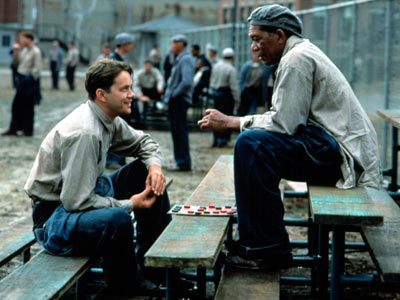 This following group of posts will not be as extensive in categories, or analysis as the Decade in Review post was for 2000-2009; it will however give a breakdown of some of my favorite films of the decade between 1990-1999. Contrary to the previous post, I will limit these posts to 10 films per decade, I will not try to limit it to the five or six I had previously said. I will, however, try to give one favorite film with some analysis followed by nine to ten other films in alphabetical order.
This following group of posts will not be as extensive in categories, or analysis as the Decade in Review post was for 2000-2009; it will however give a breakdown of some of my favorite films of the decade between 1990-1999. Contrary to the previous post, I will limit these posts to 10 films per decade, I will not try to limit it to the five or six I had previously said. I will, however, try to give one favorite film with some analysis followed by nine to ten other films in alphabetical order.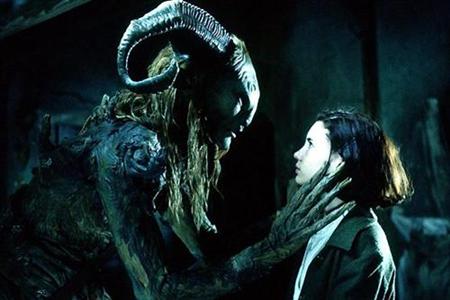
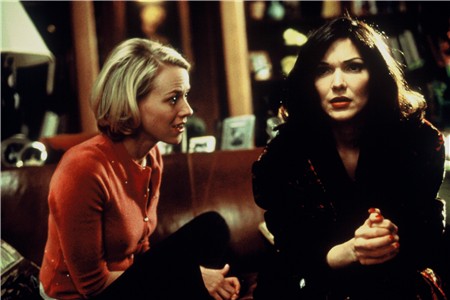 David Lynch's dark, experimental film noir, Mulholland Drive, is a mind screw of the highest quality. The film has several explanations, the question, however, is whether trying to explain this film is even necessary. I, for one, don't believe it is.
David Lynch's dark, experimental film noir, Mulholland Drive, is a mind screw of the highest quality. The film has several explanations, the question, however, is whether trying to explain this film is even necessary. I, for one, don't believe it is. In 2008 screenwriter, Charlie Kaufman, perhaps the most creative and original screenwriter currently working, made his directorial debut and, what a debut it was. Synecdoche, New York is, perhaps, the most profound film that I have ever seen exploring the nature of love, lust, life, death, art and the meaning of all of it, whether art imitates life, or life is art, or any other combination of "art" and "life" that I can put together on the fly. On the surface the film follows Caden Cotard (Phillip Seymour Hoffman) through his life from 40 - 80 (or 90 depending on whether you believe Hoffman's interview or the makeup artists) as he receives a McArthur grant and tries to make a piece of art that will define his life at the same time that it captures everyone's story.
In 2008 screenwriter, Charlie Kaufman, perhaps the most creative and original screenwriter currently working, made his directorial debut and, what a debut it was. Synecdoche, New York is, perhaps, the most profound film that I have ever seen exploring the nature of love, lust, life, death, art and the meaning of all of it, whether art imitates life, or life is art, or any other combination of "art" and "life" that I can put together on the fly. On the surface the film follows Caden Cotard (Phillip Seymour Hoffman) through his life from 40 - 80 (or 90 depending on whether you believe Hoffman's interview or the makeup artists) as he receives a McArthur grant and tries to make a piece of art that will define his life at the same time that it captures everyone's story. 1938 was a rough year for Europe. In represents the peak of the pre-war Nazi scare. A time between the Soviet-Zazi non-aggression pact and the Nazi invasion of Poland. Soviet Premiere, Josef Stalin, did not truly trust the Nazi's and he wanted the people of the Soviet Union to beware that there was a chance that the uneasy peace could be broken at anytime. Stalin turned toward his go-to filmmaker, Sergei Eisenstein, perhaps best known for his silent, Pro-Communist propaganda piece, Battleship Potemkin. This time Eisenstein takes on a less contemporary subject.
1938 was a rough year for Europe. In represents the peak of the pre-war Nazi scare. A time between the Soviet-Zazi non-aggression pact and the Nazi invasion of Poland. Soviet Premiere, Josef Stalin, did not truly trust the Nazi's and he wanted the people of the Soviet Union to beware that there was a chance that the uneasy peace could be broken at anytime. Stalin turned toward his go-to filmmaker, Sergei Eisenstein, perhaps best known for his silent, Pro-Communist propaganda piece, Battleship Potemkin. This time Eisenstein takes on a less contemporary subject. Hannah and Her Sisters may well be the best of all of Woody Allen's films. If it isn't, it is right up there with his other masterpieces, Annie Hall, Manhattan, and Crimes and Misdemeanors. The film concerns itself with Hannah (Mia Farrow), Her ex-husband (Woody Allen), her current husband (Michael Caine) and her two sisters (Barbara Hershey and Dianne Wiest). Woody Allen's character is a neurotic, hypochondriac, middle-aged, New York TV Exec who is trying to live his life while being crippled by fear and anxiety that his life is so momentary yet will be meaningless as soon as its over.
Hannah and Her Sisters may well be the best of all of Woody Allen's films. If it isn't, it is right up there with his other masterpieces, Annie Hall, Manhattan, and Crimes and Misdemeanors. The film concerns itself with Hannah (Mia Farrow), Her ex-husband (Woody Allen), her current husband (Michael Caine) and her two sisters (Barbara Hershey and Dianne Wiest). Woody Allen's character is a neurotic, hypochondriac, middle-aged, New York TV Exec who is trying to live his life while being crippled by fear and anxiety that his life is so momentary yet will be meaningless as soon as its over.